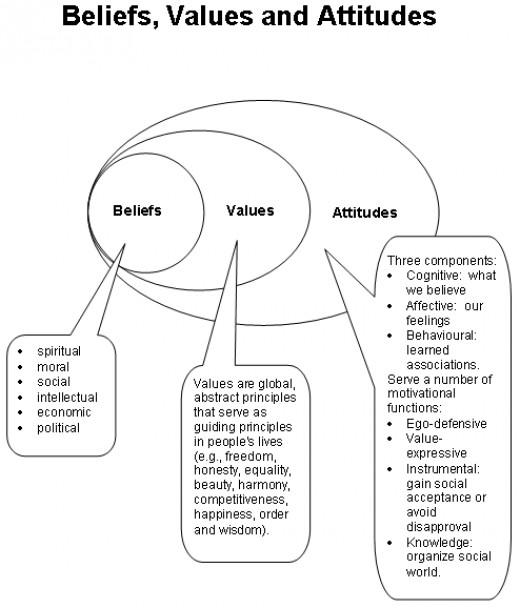
A screaming staff beckons deeper investigation (courtesy of Bay Integrated Marketing)
Have you wondered why your colleague is so irritating? Pissed off by a boss who seem to disagree with everything you propose?
Or frustrated by a “stubborn” subordinate who only wants to do things his way?
If you hope to improve your working environment (assuming you do not want to quit), it may be useful to consider the three key variables determining how your organisation behaves.
They form the building blocks of organisational culture, and can be identified as its Beliefs, Values and Attitudes as represented in the chart below (thanks to Docmo).

Courtesy of docmo
Let us marinate over these core concepts a little more deeply.
Organisational Beliefs
The most basic dimension of organisational behaviour, a belief is your assumed truth, ie a psychological state in which an individual holds a proposition or premise to be true.
A deep moral or positional view that grounds our identity, beliefs are generated through experience, experimentation, reflection or generalisation. One’s beliefs can also be influenced by external agents who are authorities that hold a canon in specific areas.
Beliefs are fundamental positions rooted deep within our being. They influence our entire world view and shape everything else that we do. As such, changing one’s beliefs do require considerable work.
Organisational Values
Our values spring from our beliefs. They can be defined as broad global principles that govern appropriate courses of action or outcomes. Shaped by your moral compass, they govern what’s right or wrong in specific contexts, determining your attitudes and behaviours.
In many organisations, you’ve probably heard of the term “shared values“. These can be explicitly highlighted or implicit in the way certain things are done. Collectively, values decide how employees respond to a particular activity or situation.
Universally, there are several values commonly adopted across different companies. They include integrity, creativity, competitiveness, diligence, resilience, and esprit de corps, amongst others.
Organisational Attitudes
Finally, an attitude is a hypothetical construct that is formed from your beliefs and values. It represents an individual or group’s affinity and perspective.
Attitudes can be positive or negative. They are often related to a specific entity, activity or object – ie a person, place, thing, or event. As you’d imagine, the manifestation of your colleague, boss, or subordinate’s actions are dependent on their attitudes.
Three Components of Attitudes
Attitudes in general comprise three components:
- Cognitive, ie the stuff that you believe and think about;
- Affective, ie the stuff that affects your feelings and emotions; and
- Behavioural, ie the associations that are learned through doing.
To effectively change the culture of your organisation, you need to understand the relationships between your employees’ beliefs, values and attitudes.
It is counterproductive to set draconian rules to correct behaviours without gaining a deeper insight into why people do what they do based on their deep-rooted beliefs and corresponding values.
Put it another way, you need to investigate the deep underlying beliefs, values and attitudes of your employees before any behavioural changes can be effected. This works from an entire workforce down to each and every employee.
By studying these causative factors, leaders and managers are better able to shape the way your organisation behaves and drive much needed cultural change. This is critical in an age where culture has become the new strategy.
